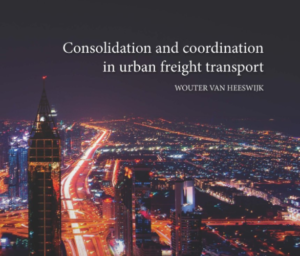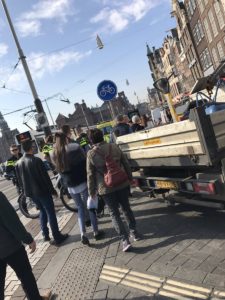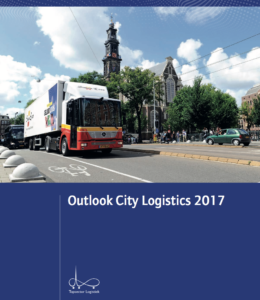Electric freight vehicles: insights into decision-making process of frontrunners
To achieve emission reduction targets and to improve local air quality of cities, the uptake of Electric Freight Vehicles (EFV) is essential. Knowledge concerning why companies do adopt EFV is lacking. Research about the diffusion of innovations and the market of EFV shows that frontrunner companies with an innovative or early adopting mindset are adopting …
New Phd-thesis on consolidation and coordination in urban freight

Due to growing urbanization, fragmentation of freight flows, and increasingly strict delivery conditions, cities around the world have to deal with a vastly increasing number of freight transport flows. Carriers are unable to efficiently bundle these flows, resulting in inefficient urban transport. This inefficiency contributes to negative environmental effects such as hazardous emissions, traffic jams, …
Lessons learned from construction logistics in Vienna (AU)

On April 24 – 26 representatives from Austria, Belgium, The Netherlands and Sweden met in Vienna for a CIVIC project meeting and site visit. During the two days the participants discussed the progression of the project’s different work packages and visited the demonstration site Seestadt Aspern in Vienna. The CIVIC project is almost half way.
Good practices in urban construction logistics

The SUCCESS project presented a new report demonstrating the potential of the solutions developed by SUCCESS to be replicated and transferred afterwards. It consolidates 22 good practices observed mainly in European countries and USA to improve knowledge and understanding of the construction supply chain and logistics.
Report: global best practices in improving urban freight efficieny
A new Pembina Institute report looks at municipal and industry-led initiatives and solutions to address urban freight challenges, that are done through a variety of stakeholder engagement and collaborative approaches. Pembina highlight best practices in freight management, including case studies from New York City, Toronto, Sweden and London, England.
London: how to stop the construction industry choking our cities?
Poor air quality is now thought to be the cause of 40,000 deaths in the UK each year. But while cars and lorries have attracted most attention, less reported is the contribution of other polluters to the problem, particularly construction sites. According to the London Atmospheric Emissions Inventory construction sites are responsible for 7.5% of damaging NOx …
Intelligent Access Program to monitor urban freight
The Australian Intelligent Access Program (IAP) is a national program developed in partnership with all Australian road agencies. It uses satellite tracking and wireless communication technology to remotely monitor where, when, and how heavy vehicles are being operated on the road network. It provides an opportunity for transport operators to achieve productivity gains, better turnaround …
Smart construction logistics keeps cities livable: chaos is a choice

Disruptions due to construction activities will increase substantially in Dutch cities over the coming years. But setting up smart construction logistics in advance will prevent most of the disruption, argue Walther Ploos van Amstel and René Postulart. “That that will not only save money, as the Dutch logistics sector has calculated, but also immediately cut …
DHL Parcels testing barges in Gothenburg (S)
DHL Parcels is testing the use barges for shipments to central Gothenburg (S) which are then distributed by cargobike in the city.

